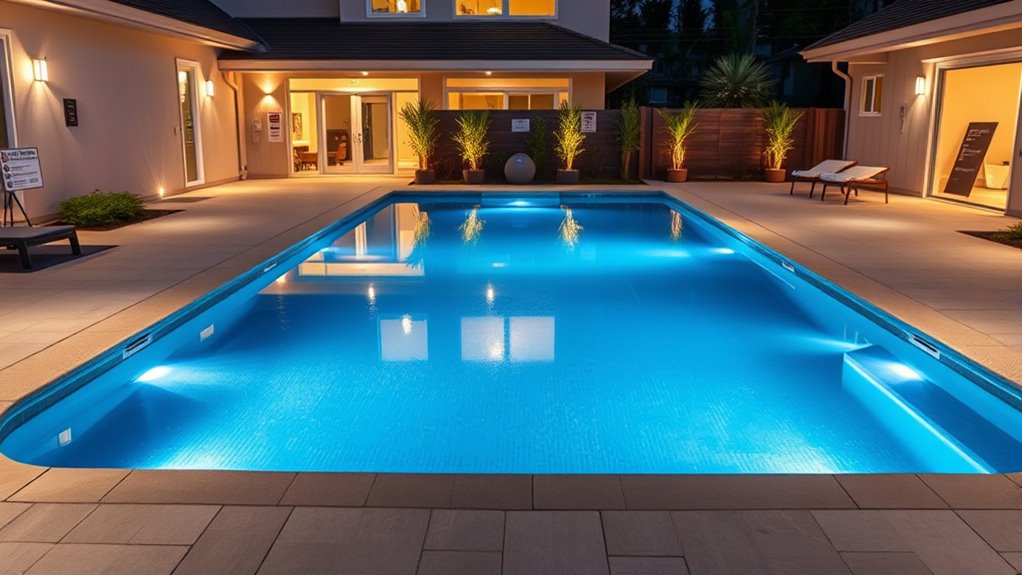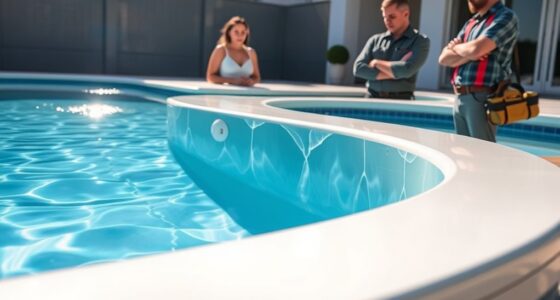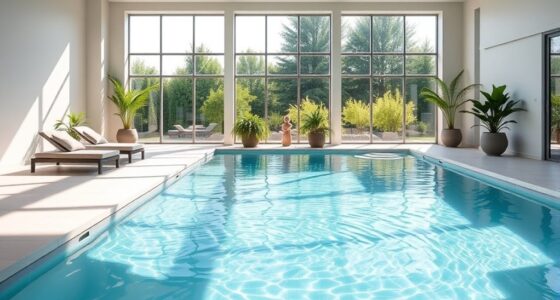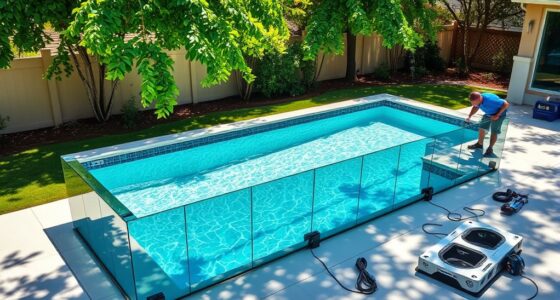When installing an endless pool, you’ll need to check local building codes, zoning laws, and property restrictions that may affect your project. Obtain the necessary permits for pool installation, ensuring compliance with safety, electrical, and plumbing standards. You’ll also need to follow environmental regulations regarding water use and discharge. Inspection and approval processes vary by location, so understanding these requirements helps prevent delays. Keep exploring to learn more about smoothing your installation process efficiently.
Key Takeaways
- Verify local building codes, zoning laws, and setback requirements before installation.
- Obtain necessary permits for construction, electrical, and plumbing connections early.
- Ensure compliance with safety regulations, including fencing, barriers, and alarms.
- Follow electrical wiring and plumbing standards, using approved materials and proper inspections.
- Schedule inspections to confirm structural, electrical, and safety compliance throughout the process.
Understanding Local Building Codes

Understanding local building codes is essential before installing an endless pool, as these regulations guarantee your project complies with safety and structural standards. You need to know the specific requirements for setbacks, foundation strength, and electrical wiring to avoid costly violations. Local codes may dictate pool depth, fencing, and barriers to ensure safety for everyone. Failing to follow these rules could result in fines or having to remove your pool later. Check with your city or county building department early in the planning process. Obtain necessary inspections and approvals before proceeding. Staying informed about codes helps you avoid surprises and guarantees your pool installation is legal and safe. Always prioritize compliance to protect yourself and your property investment.
Zoning Laws and Property Restrictions

You need to check your local zoning laws because they can vary widely and impact where you can install your pool. Property line restrictions might limit the size or placement of your endless pool, so it’s essential to know your boundaries. Ignoring these rules could lead to costly setbacks or legal issues down the line. Additionally, understanding local regulations related to pool installation can help you ensure compliance with safety and construction standards.
Local Zoning Variations
Local zoning laws and property restrictions can substantially impact your ability to install an endless pool on your property. Variations between municipalities mean rules can differ widely, affecting pool size, placement, and visibility. Some areas may restrict pool installations to certain zones or require setbacks from property lines and structures. Others may have height or aesthetic guidelines to maintain neighborhood character. It’s essential to research your local ordinances and consult zoning departments early in your planning process. Failing to adhere to these variations can lead to fines, delays, or the need to remove your pool. Understanding local zoning variations helps you navigate requirements smoothly, ensuring your endless pool complies with regulations and fits within your community’s standards. Additionally, being aware of property restrictions can prevent legal issues and ensure your installation proceeds without complications.
Property Line Considerations
Property line considerations are a key factor when planning to install an endless pool, as zoning laws and property restrictions often specify how close structures can be built to lot boundaries. You need to check local regulations to determine setback requirements, which may vary depending on your zone or municipality. Some areas require a minimum distance from property lines to ensure safety, privacy, and compliance with neighborhood standards. Failing to observe these rules can result in fines, orders to remove the pool, or delays in obtaining permits. It is vital to review your property survey and consult local building departments early in the planning process. Being aware of spoiled lemon juice signs and other regulations can help you avoid legal issues and ensure your pool installation proceeds smoothly.
Permits Required for Pool Installation

Before installing an endless pool, it is essential to determine what permits are required, as regulations vary by location. Check with your local building department or city hall to find out if a permit is necessary. Many areas require a building permit to guarantee your pool installation complies with safety and zoning codes. You might also need electrical and plumbing permits if you’re connecting the pool to existing systems. Some jurisdictions have specific rules based on pool size, placement, or proximity to property lines. Failing to obtain the proper permits can lead to fines, delays, or even the need to remove the pool later. Always verify permit requirements early in the planning process to avoid issues and guarantee a smooth installation. Additionally, understanding local regulations helps ensure your pool installation remains compliant with current laws.
Safety Regulations and Compliance Standards

Ensuring your endless pool meets safety regulations and compliance standards is crucial for a secure and successful installation. You must adhere to local codes that specify safety barriers, electrical wiring, and drainage requirements. These standards help prevent accidents and ensure reliable operation. Check that your pool features proper fencing, alarms, and non-slip surfaces. Use the following table to understand key safety components:
| Safety Element | Purpose |
|---|---|
| Fencing and barriers | Prevent unauthorized access |
| Electrical safety | Avoid shocks and fire hazards |
| Drainage systems | Prevent flooding and water damage |
| Emergency exits | Enable quick evacuation in emergencies |
Meeting these standards protects you and ensures compliance with legal requirements. Proper inspection procedures are also essential to confirm ongoing safety compliance.
Environmental Regulations and Water Use Policies

Because water is a valuable resource, complying with environmental regulations and water use policies is essential when installing an endless pool. You need to guarantee your setup minimizes water waste and respects local conservation rules. These regulations might include restrictions on water recycling, requirements for water treatment, or limits on water consumption during peak hours. Imagine:
- Using rainwater harvesting systems to supplement supply
- Installing efficient filtration to reduce chemical use
- Monitoring water levels regularly to prevent overuse
- Ensuring proper drainage to avoid runoff issues
- Adhering to local water consumption caps during dry seasons
- Choosing water-saving equipment and filtration technology that optimizes water use efficiency. Staying compliant helps protect natural resources and avoids fines. Check with your local authorities to understand specific policies affecting your installation and ensure your pool operates sustainably within the environment.
Electrical and Plumbing Code Requirements

You need to guarantee your electrical wiring meets local standards to keep everything safe and compliant. Proper plumbing connections are just as important for preventing leaks and maintaining water quality. Let’s go over the key electrical wiring standards and plumbing connection guidelines you should follow. Ensuring your compliance with safety regulations is crucial to prevent potential hazards and ensure the longevity of your endless pool setup.
Electrical Wiring Standards
Adhering to electrical wiring standards is essential when installing an endless pool to guarantee safety and compliance with local codes. Proper wiring protects against electrical shock, prevents equipment damage, and ensures reliable operation. You should focus on:
- Using ground-fault circuit interrupters (GFCIs) to cut power during faults
- Employing weatherproof, corrosion-resistant conduit and fittings
- Installing dedicated circuits to handle the pool’s power load
- Routing wiring away from water sources and potential flooding areas
- Ensuring all connections are secure, insulated, and compliant with the National Electrical Code (NEC)
- Recognizing that inspirational quotes about fatherhood can serve as motivational reminders of the importance of safety and responsibility in every aspect of life.
Plumbing Connection Guidelines
Have you considered how plumbing connections must conform to both electrical and plumbing code requirements to guarantee safety and functionality? Proper plumbing ensures your endless pool operates smoothly and minimizes leaks or water damage. You need to use approved materials, such as corrosion-resistant pipes and fittings, and ensure proper drainage and venting. Local codes often specify pipe sizes, pressure ratings, and insulation standards. Pressure regulators and backflow preventers are essential to protect your water supply. Additionally, all connections should be secure and leak-free, with accessible shut-off valves for maintenance. Before starting, consult local building codes to confirm compliance. Proper plumbing not only keeps your pool functioning well but also ensures safety for everyone around it. Incorporating vetted industry standards can further enhance the reliability and safety of your installation.
Inspection and Approval Processes

Before installing an endless pool, guaranteeing it passes all inspection and approval processes is essential. These steps verify that your pool meets safety, building codes, and environmental standards. During inspections, officials will check:
Ensuring your endless pool passes inspections guarantees safety, compliance, and smooth installation.
- Structural integrity of the pool’s frame and foundation
- Proper electrical wiring and grounding
- Adequate fencing or barriers for safety
- Correct plumbing connections and drainage systems
- Compliance with local zoning and setback requirements
Passing these inspections confirms your pool is safe and legal. You may need to schedule multiple visits or submit detailed plans beforehand. Failure to meet standards can result in delays or costly modifications. Staying proactive and prepared ensures your pool installation proceeds smoothly and adheres to all regulations. Incorporating regular assessments and rotations of items in the planning process can help prevent overlooked safety issues and ensure ongoing compliance.
Tips for Navigating Permits and Regulations

Controlling permits and regulations can seem intimidating, but approaching the process with a clear plan makes it manageable. Start by researching local building codes and zoning laws specific to your area. Contact your city or county permit office early to understand required documentation and fees. Keep detailed records of all correspondence and submissions. It helps to consult with a professional, like a contractor or permit specialist, who understands local regulations. Be proactive in addressing potential issues; don’t wait for inspections to raise concerns. Staying organized and informed ensures a smoother approval process. Remember, patience is key—permits can take time, but following the rules ensures your endless pool installation is legal, safe, and hassle-free.
Frequently Asked Questions
How Long Does the Permit Approval Process Typically Take?
The permit approval process usually takes about 2 to 4 weeks, but it can vary depending on your local authorities. You should submit all required documents promptly and guarantee your plans meet zoning and safety codes. To avoid delays, stay in contact with your permitting office and respond quickly to any additional requests. Planning ahead helps you get your endless pool installed smoothly and on schedule.
Are There Specific Noise Restrictions for Pool Operation?
Think of your pool as a gentle symphony in a quiet forest. Noise restrictions usually limit loud operational sounds, keeping your pool’s hum and pump noise within acceptable levels. You’ll want to verify local ordinances, which often specify decibel limits, especially during nighttime hours. By staying within these boundaries, you ensure harmony with neighbors and avoid potential fines, creating a peaceful oasis that blends seamlessly with its surroundings.
Can I Install an Endless Pool Indoors Legally?
Yes, you can install an endless pool indoors legally, but you need to check local building codes and zoning laws first. Confirm your space has proper ventilation, adequate ceiling height, and sufficient structural support. You might also need permits for electrical work and plumbing. Consulting with a professional ensures you meet all safety standards and regulations, making your indoor pool installation smooth and compliant with local laws.
What Are the Penalties for Non-Compliance With Regulations?
If you don’t comply with regulations, you could face hefty fines, legal action, or even the requirement to remove your pool. You might also encounter penalties if safety standards aren’t met, risking liability for any accidents. Non-compliance could delay your project, increase costs, and lead to insurance issues. To avoid these penalties, always follow local laws, acquire necessary permits, and ensure your pool meets safety and building codes.
Do Permits Cover Maintenance or Only Installation?
Permits typically only cover the installation of your endless pool, not ongoing maintenance. Once your pool is installed and approved, you’re responsible for regular upkeep, safety checks, and repairs. Local regulations focus on ensuring proper installation initially, but maintenance is usually up to you. However, it’s a good idea to check with your local authorities or homeowner’s association, as some areas may have specific requirements for ongoing safety or inspections.
Conclusion
Finding permits and regulations might seem daunting, but it’s worth the effort to ensure your endless pool is installed safely and legally. By doing your homework and following the rules, you’ll avoid surprises down the road and keep your project running smoothly. Remember, it’s better to cross your t’s and dot your i’s now than deal with headaches later. Stay informed, stay compliant, and you’ll be swimming happily in your new pool in no time.









